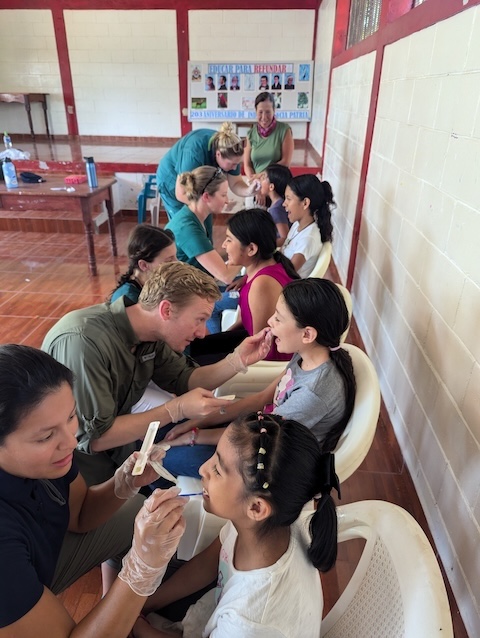Tanner Carlock, MD: Wright State University- Obstetrics & Gynecology- PGY-2
Honduras: November 2024

As we began our drive from the Tegucigalpa Honduras airport through the winding and occasionally paved roads, I knew this medical brigade experience would be different from what I had anticipated. I have seen poverty, but the combination of poverty and isolation encountered in Intibucá Honduras creates unique challenges.
Following a trek that spanned two days, we arrived at the peaceful and isolated community of Guaichipilincito. We were the only doctors within 45 minutes. When the clinic doors opened the following morning, patients were lined up and waiting. Many patients shared their life stories of being raised in the area and working harvesting corn in the mountainous fields. It was common to see someone who had walked 1-2 hours to see us. Their chronic occupational-related musculoskeletal pain often robbed them of sleep at night. Topical ointment and over-the-counter pain medication to alleviate their pain and allow them to continue to work were easy requests to fill. For those with hypertension, diabetes, epilepsy, or depression, our brigade was the only opportunity for them to receive their medication.
I not only saw patients in the clinic but was also able to visit them in their homes. I took vital signs on a young child with cerebral palsy while they were lying in their hammock, where they remained most of the day. I assessed a heart murmur while kneeling next to a pile of recently harvested corn. I removed a bug from a child’s ear and impacted cerumen from another’s while they sat on a boulder outside their home. We applied fluoride to children’s teeth during an impromptu break from their math class.
These experiences are in stark contrast to the typical exam rooms and diagnostic studies found at large medical centers. However, the caring and human touch of medical healing was uniquely profound. Our patients in Guaichipilincito desire the same care and reassurance as anyone. They appreciate the focus that a thorough exam provides and the warmth of a smile. The exam chair does not matter when the patient knows you sincerely care.
One might view a medical brigade as a great service to others. Until you experience it you do not realize that it is the patients providing a service to you. I will never see the world the same. The lessons learned in that short week will guide my personal life and medical care forever. Without support from the Benjamin H. Josephson, M.D. Fund, this experience would not have been possible. From a personal and professional perspective, I sincerely thank Dr. Josephson for his legacy, the donors for continuing to support humanitarian work in line with his legacy, and those who direct the fund for facilitating this life-changing experience. My life and the lives of my future patients will continually benefit from this transformative experience. I sincerely thank you.